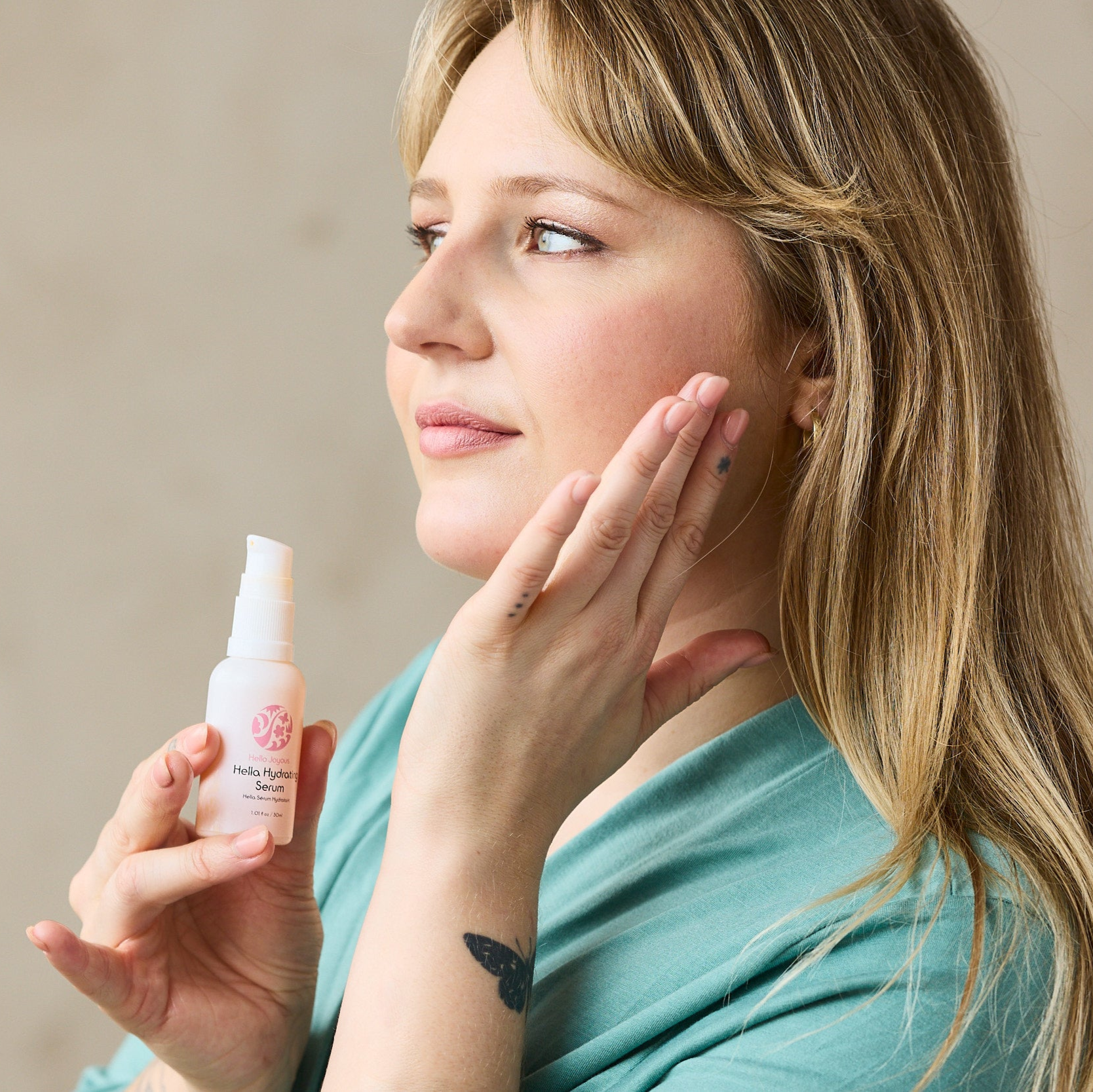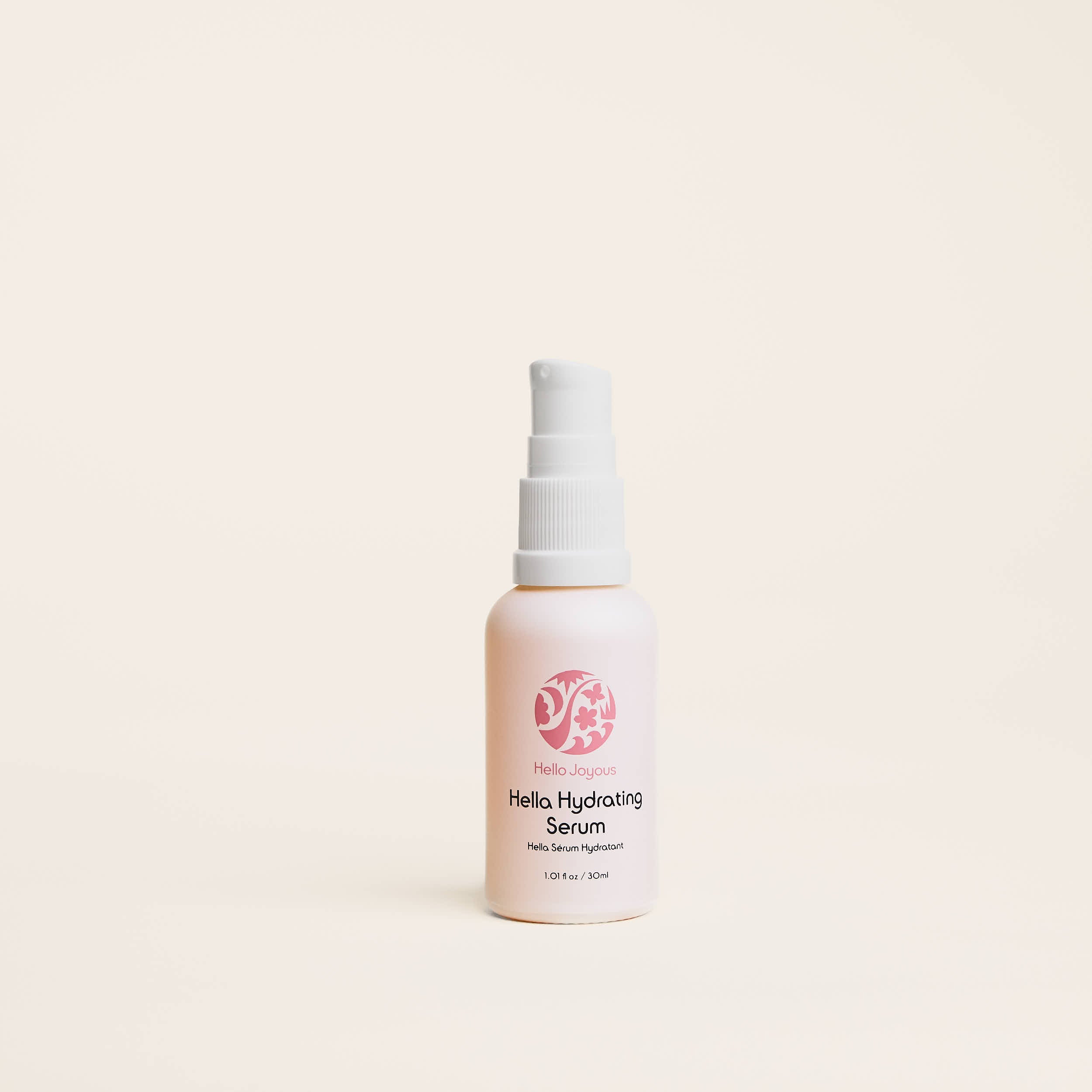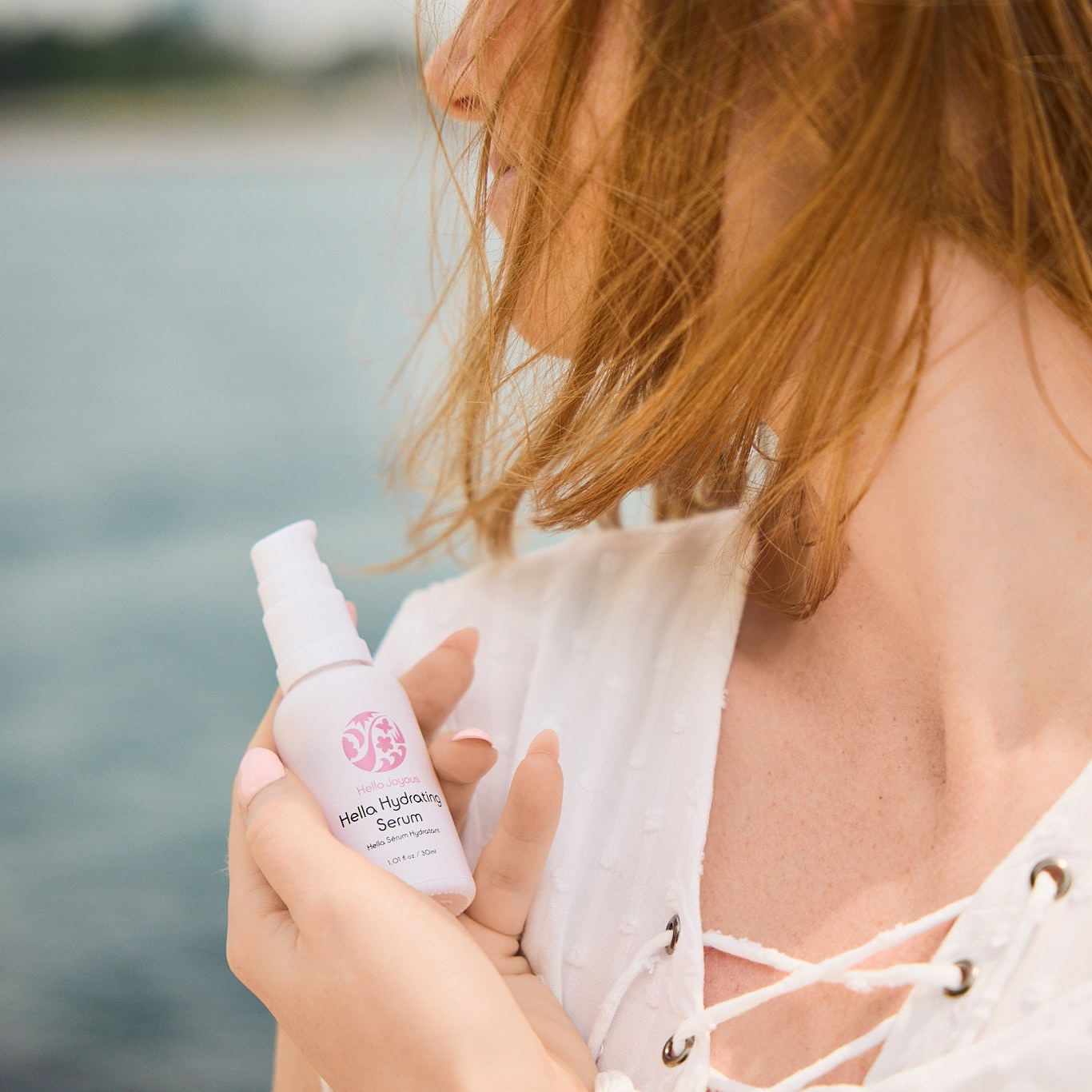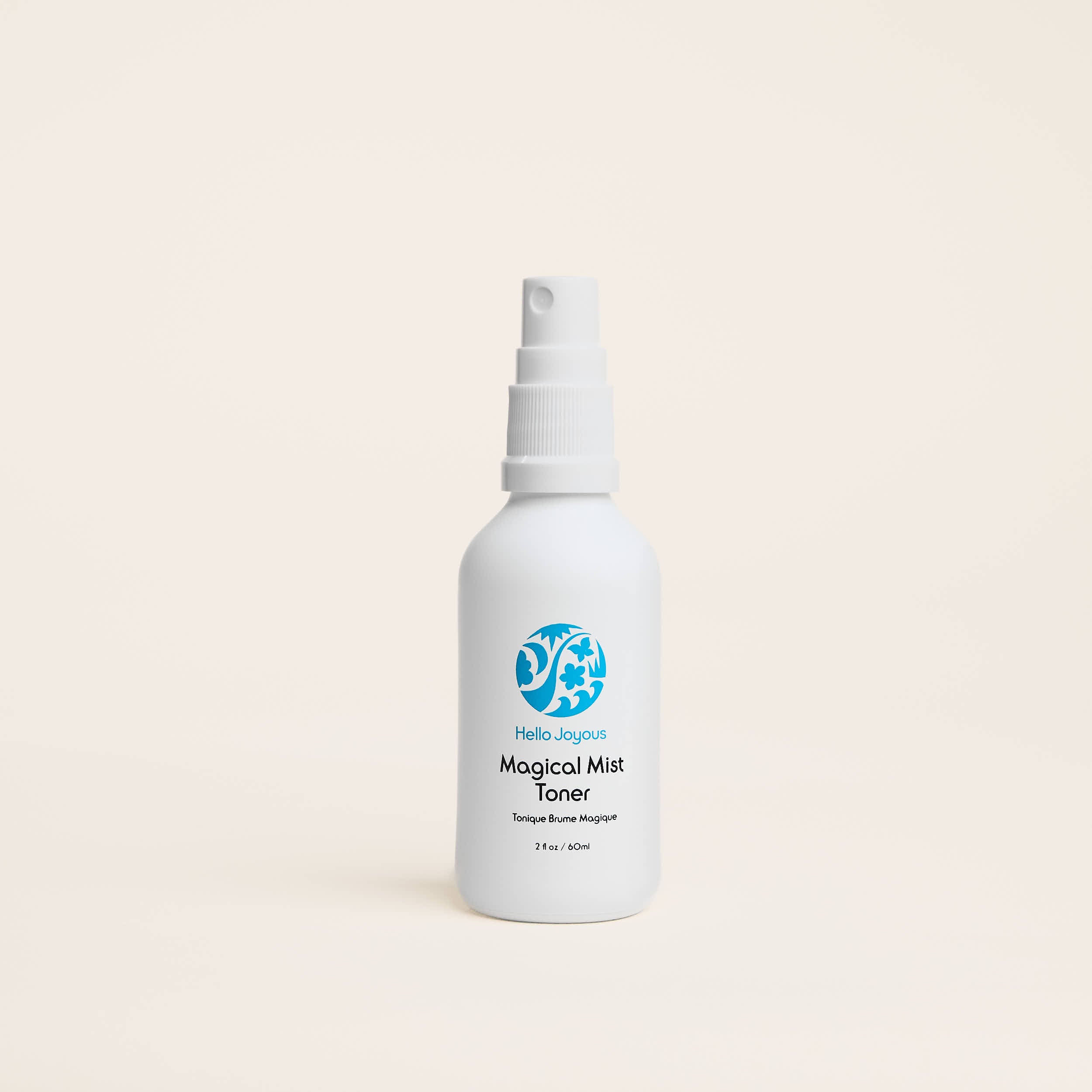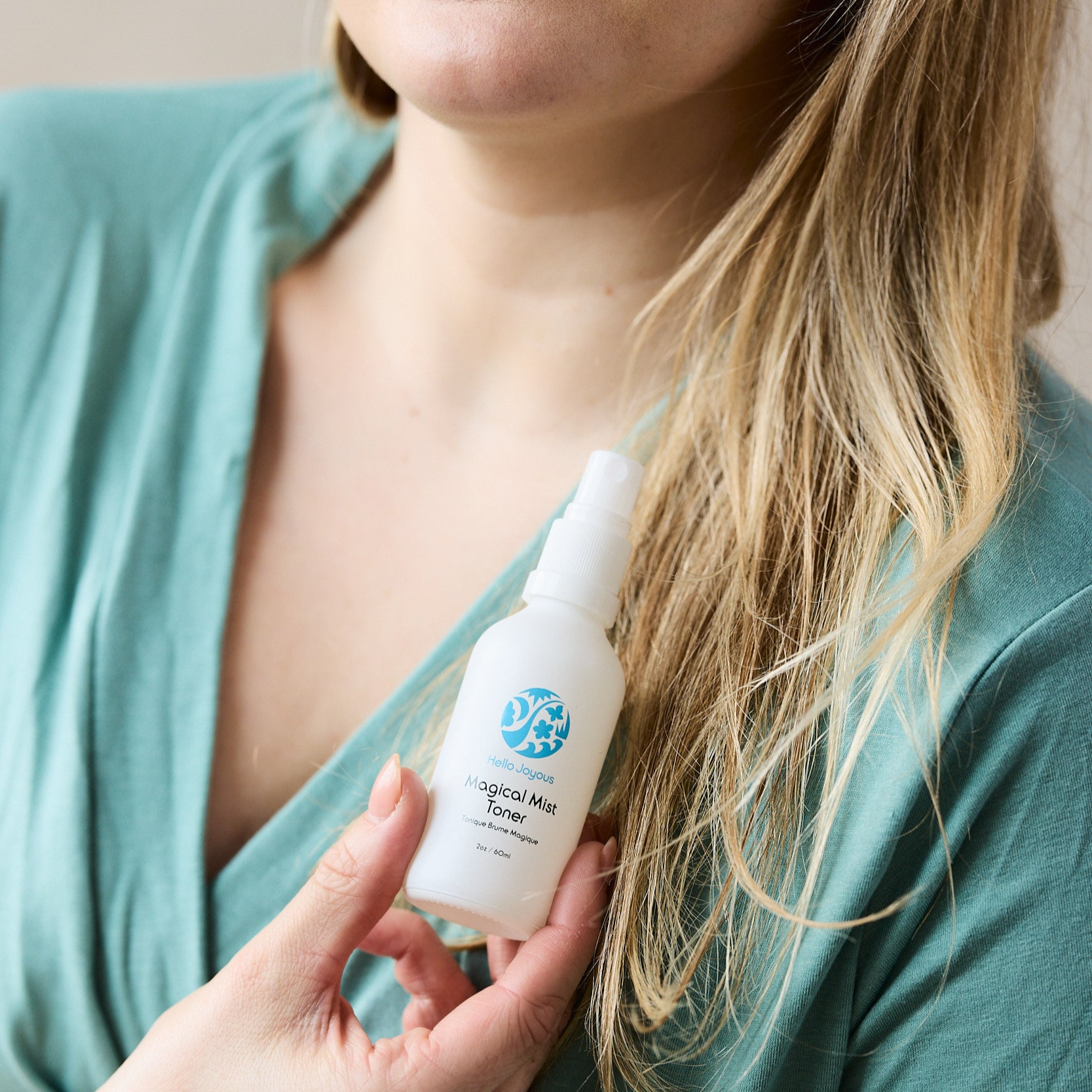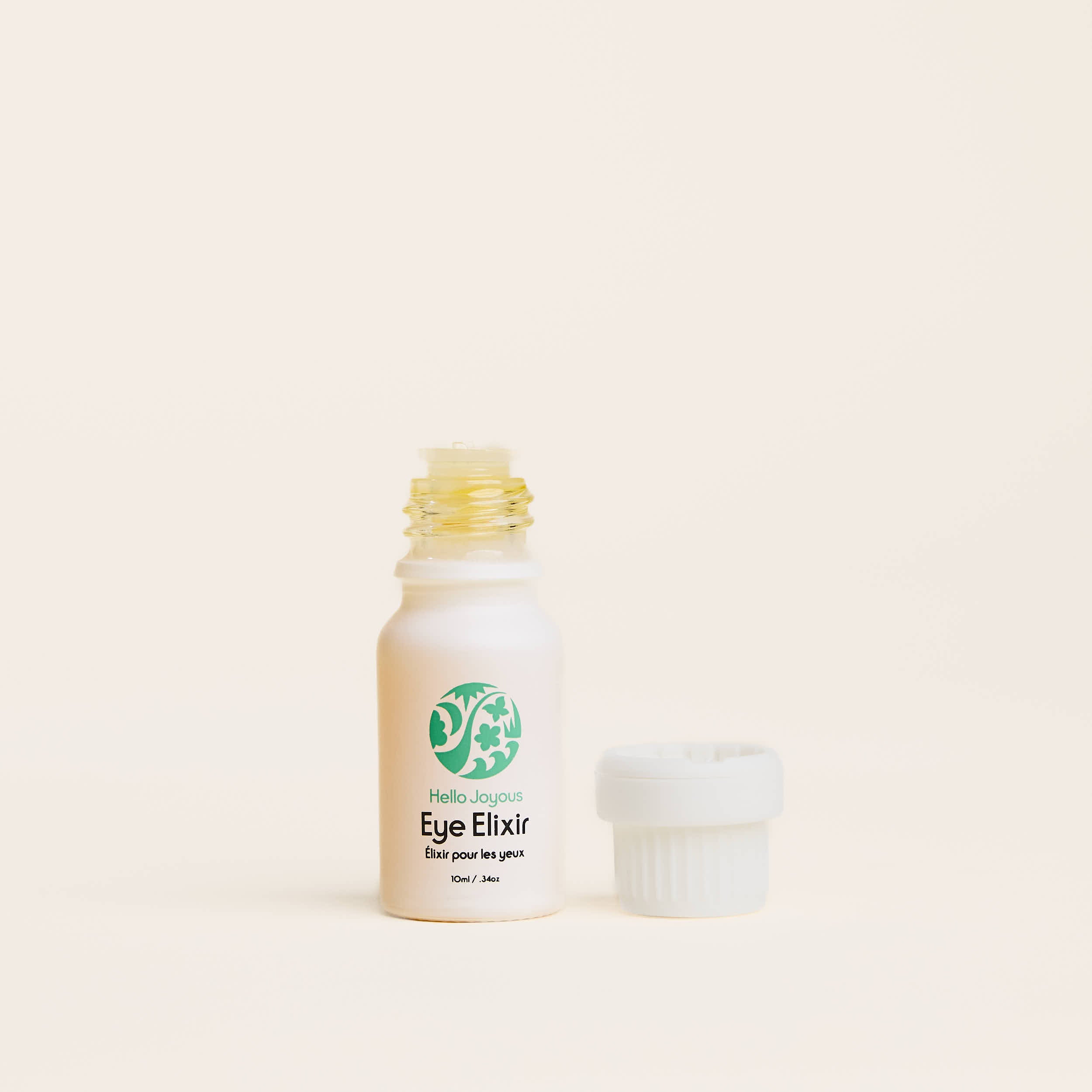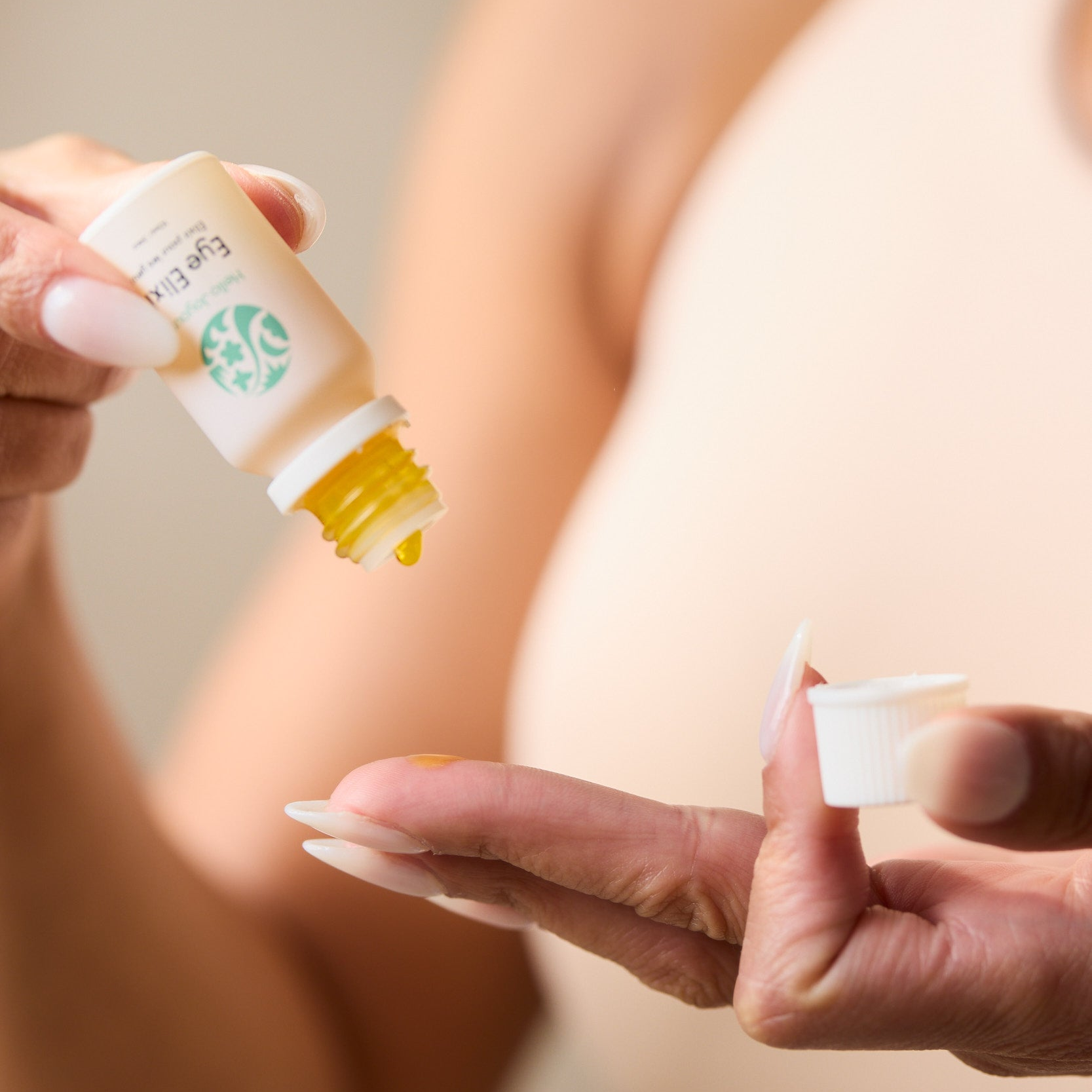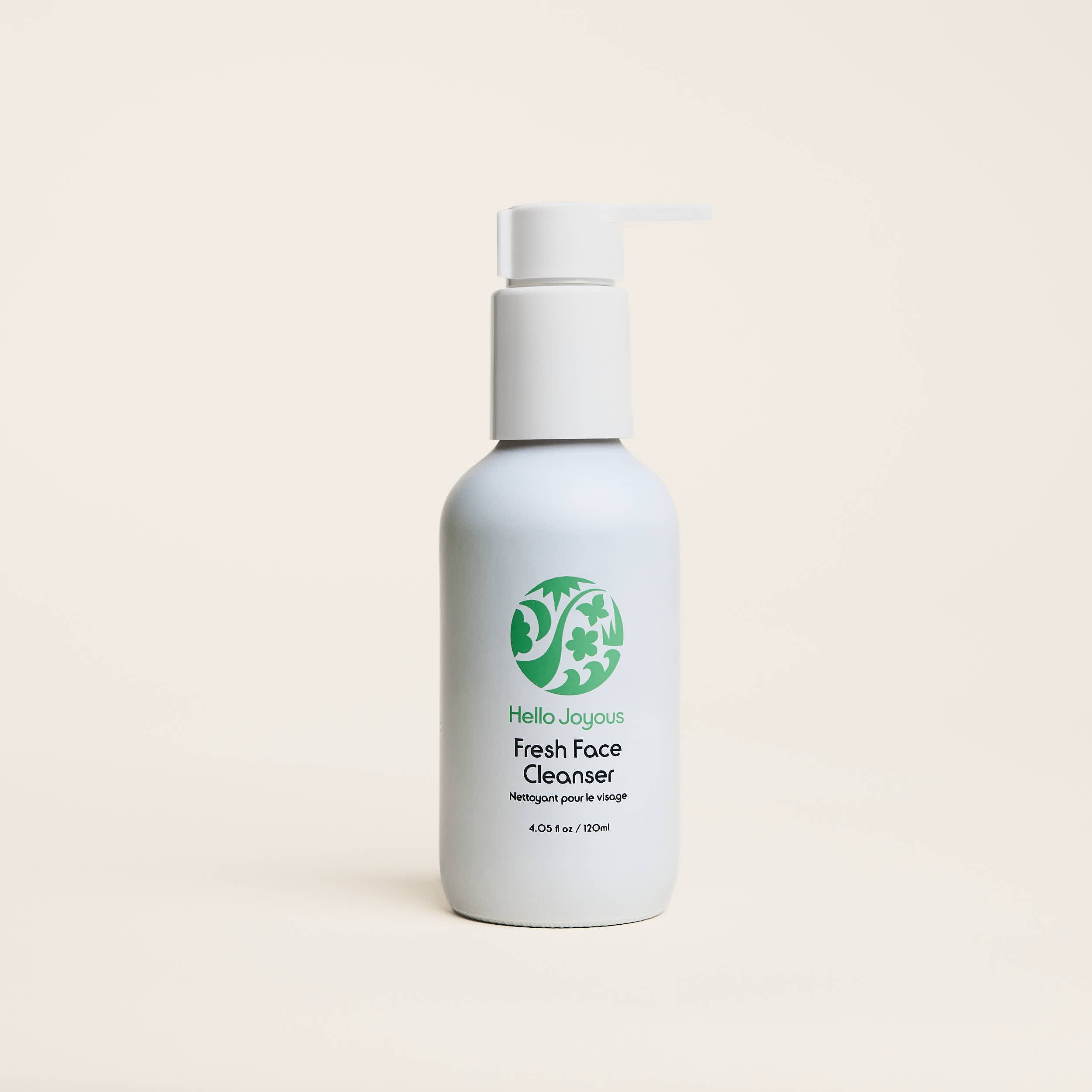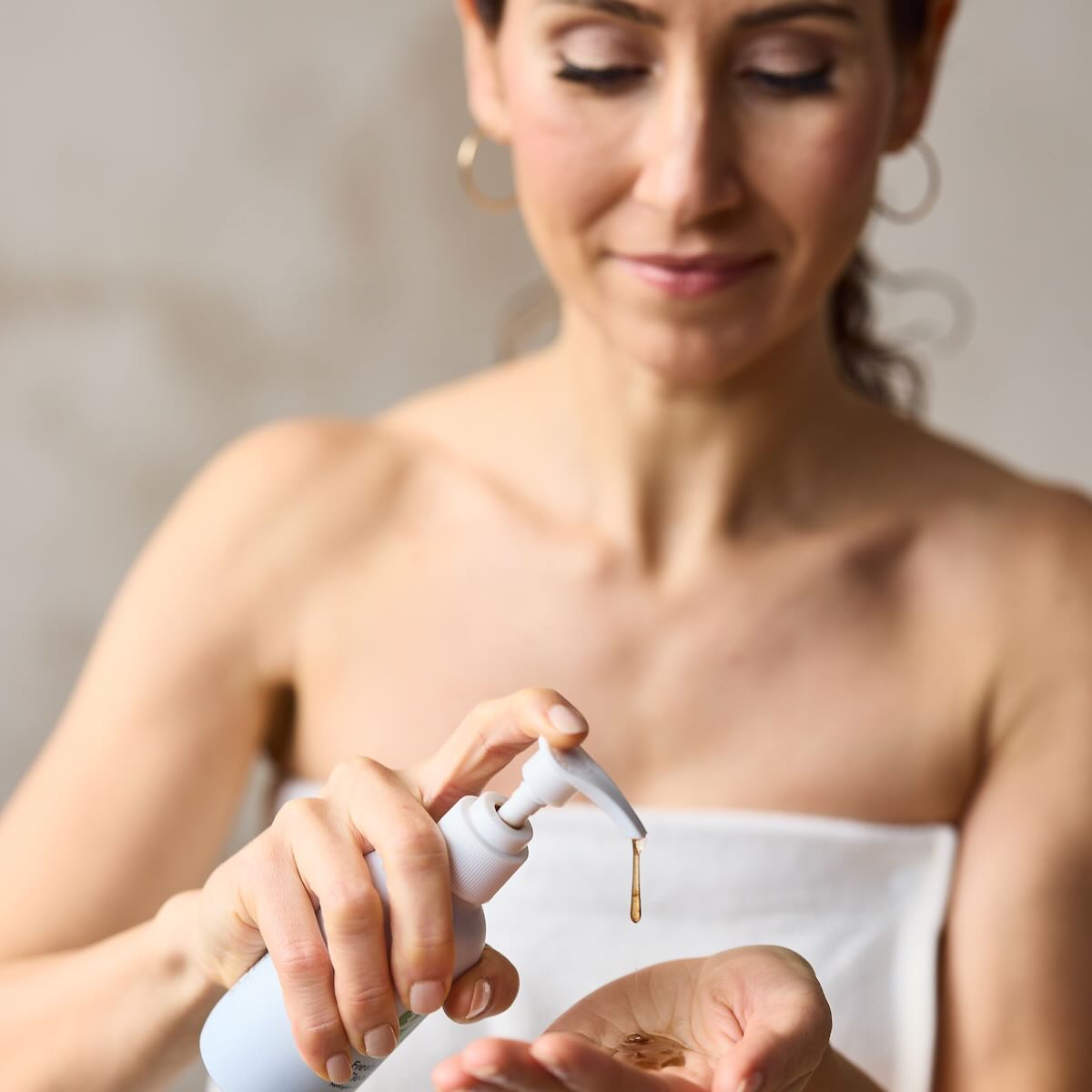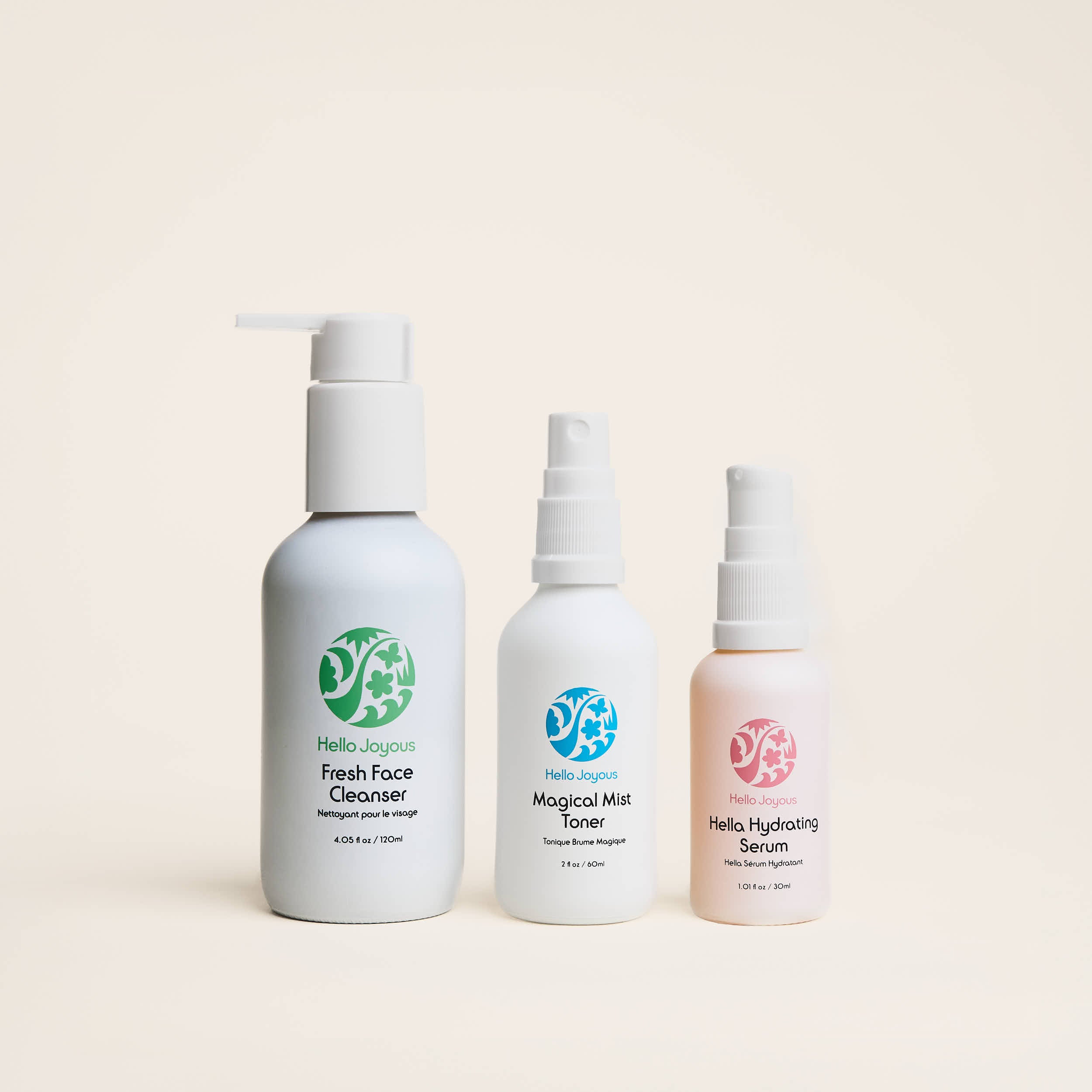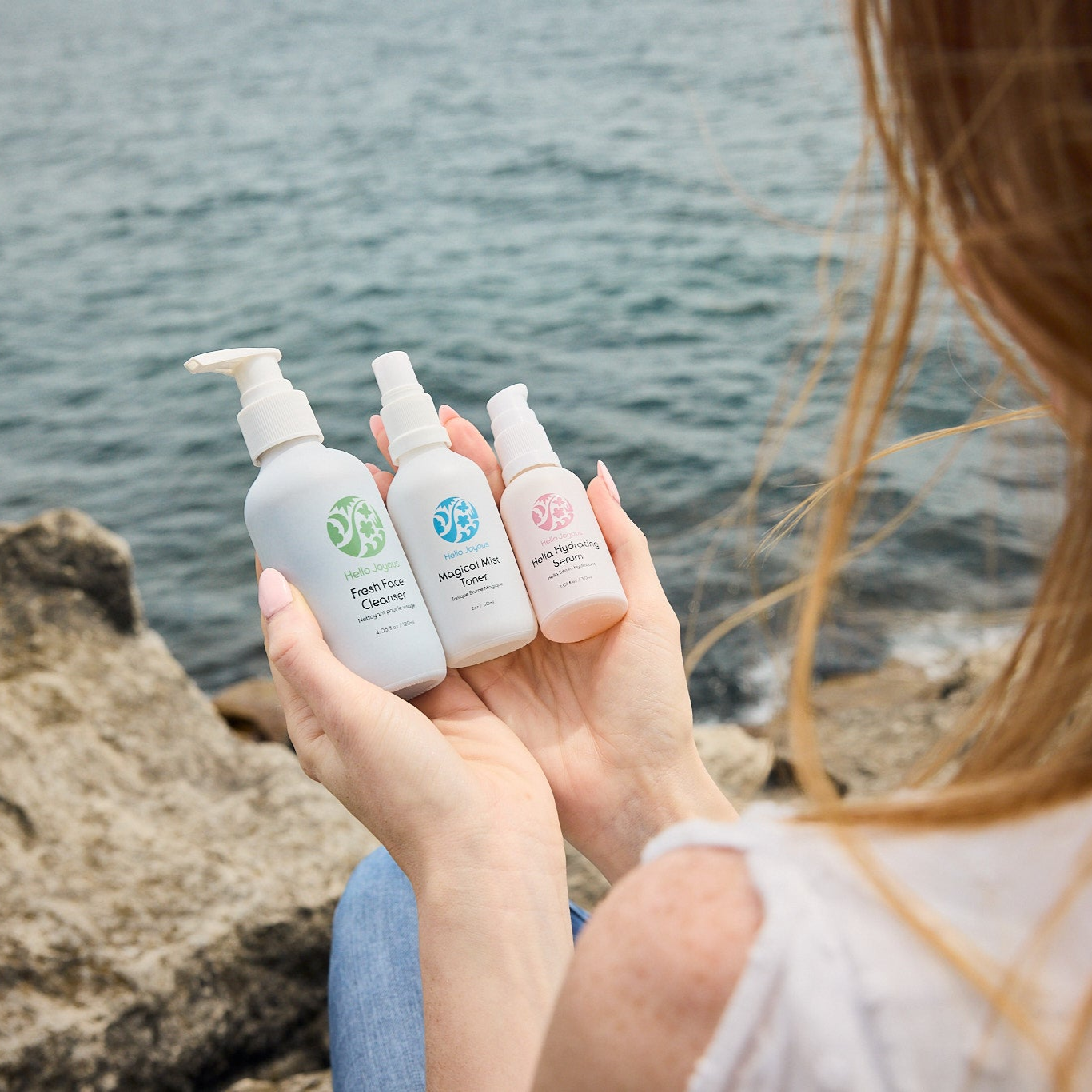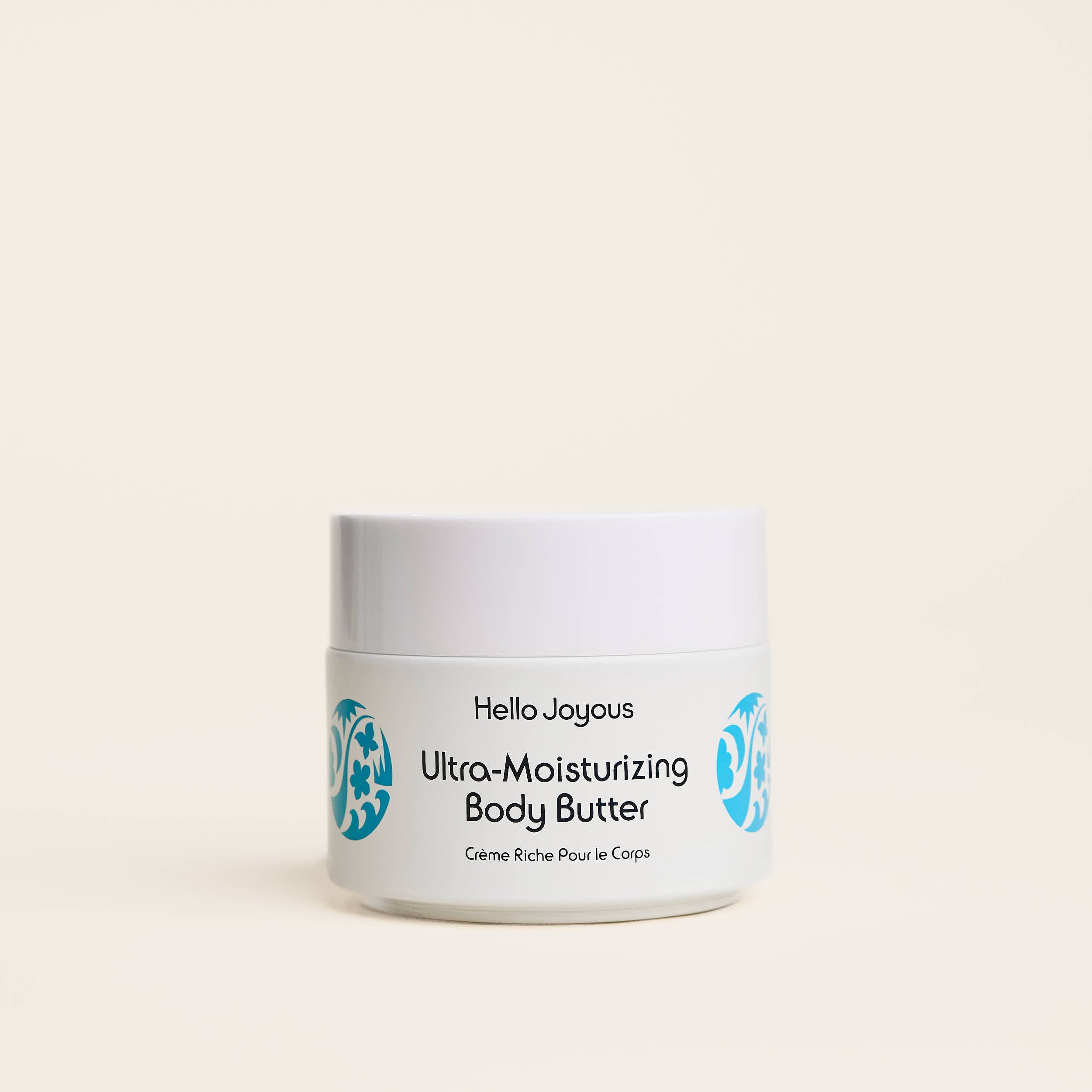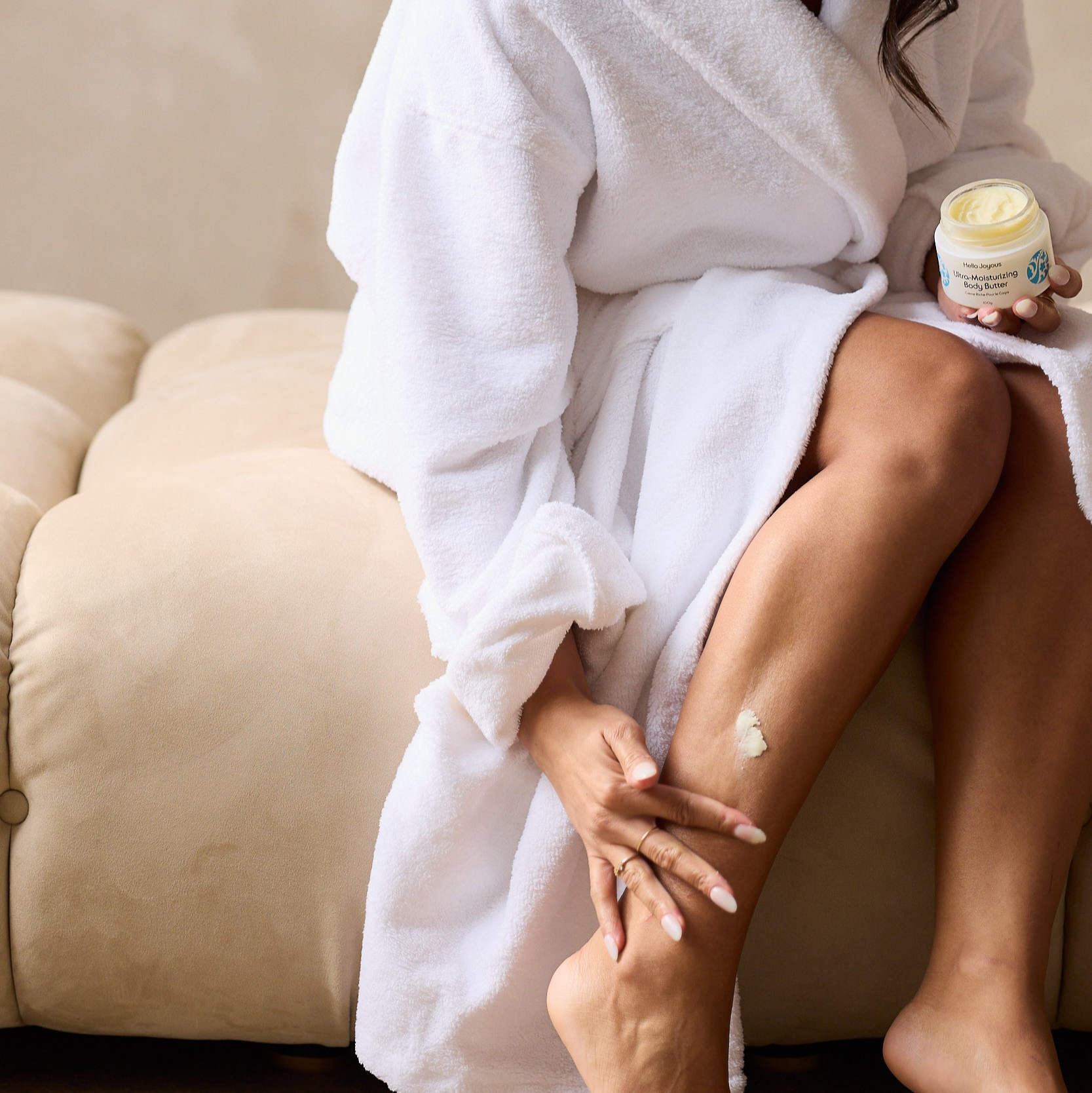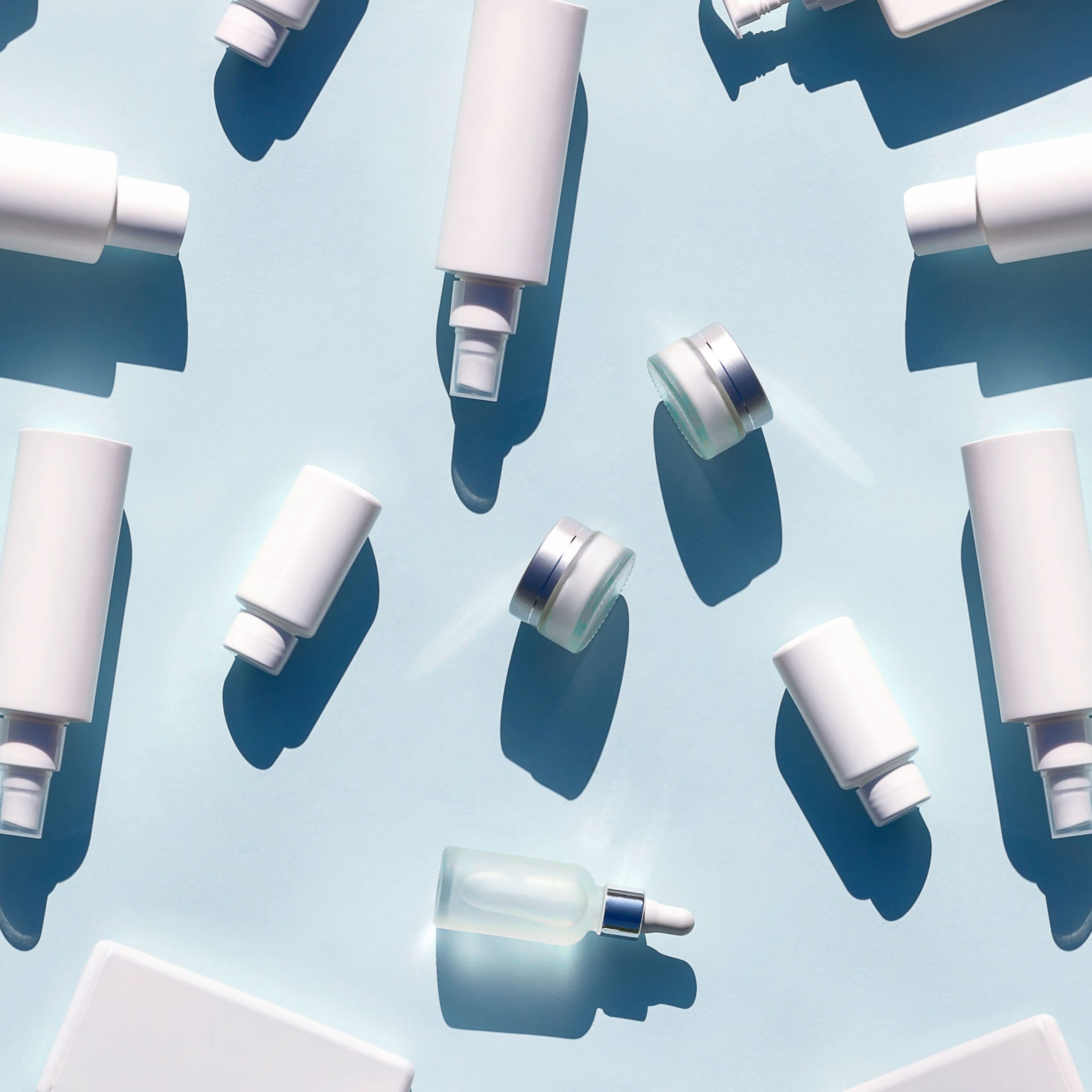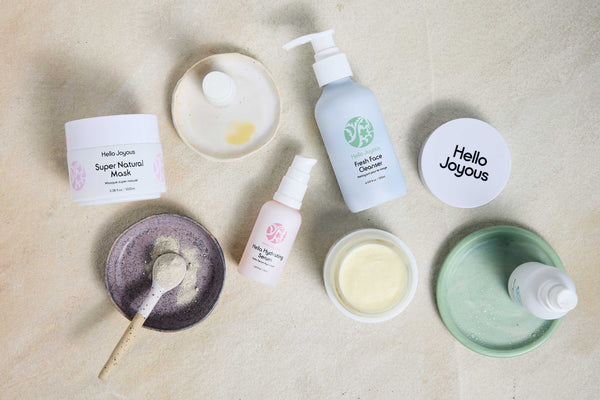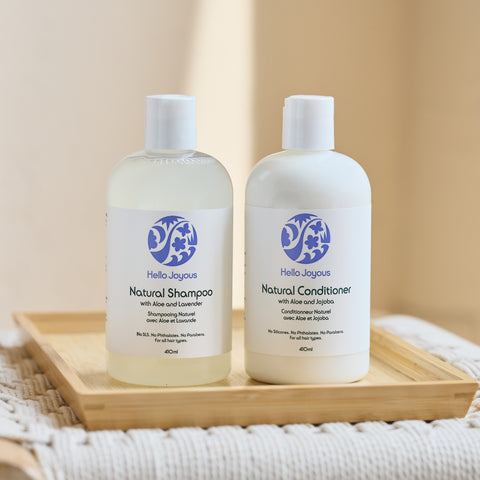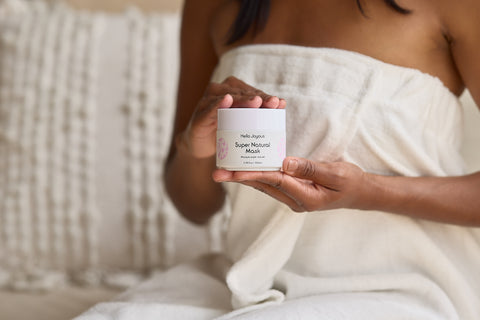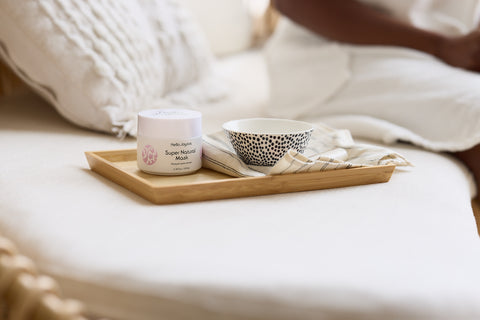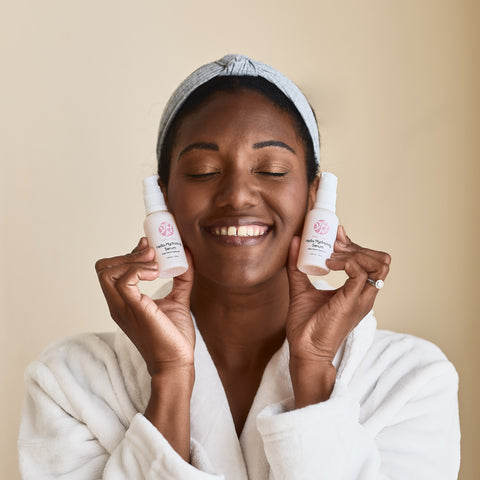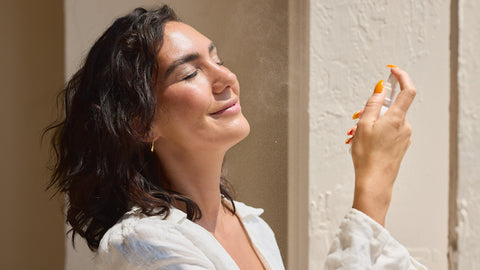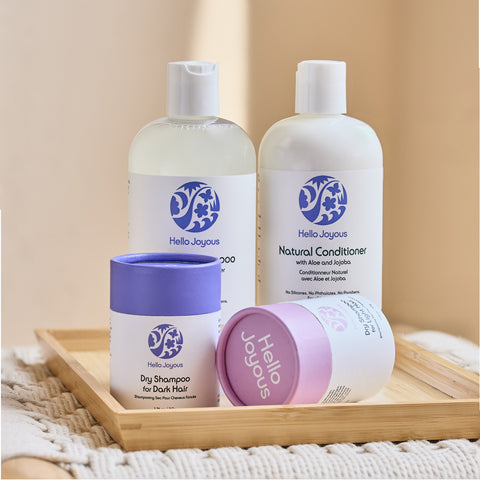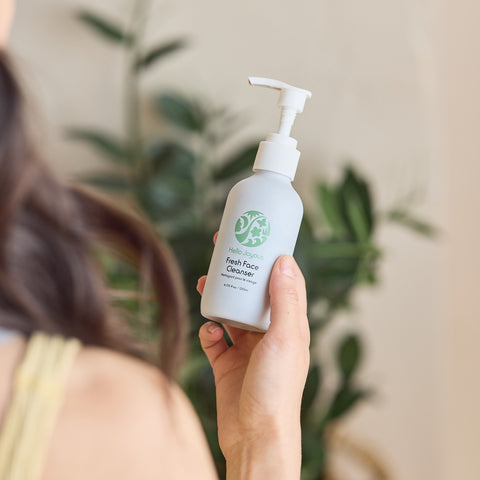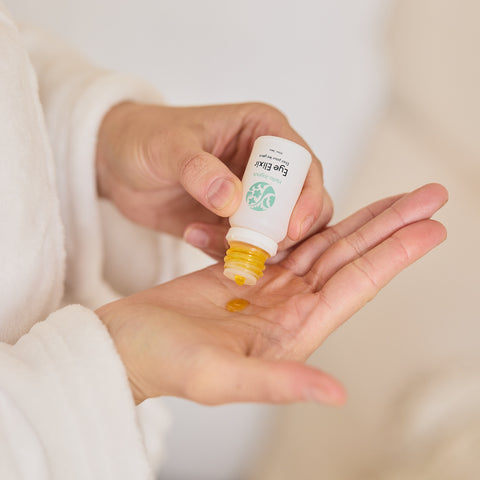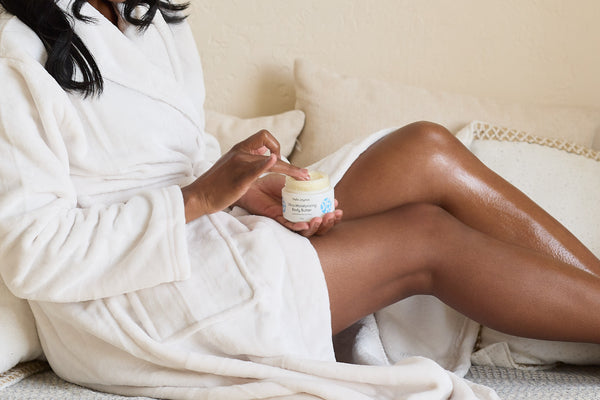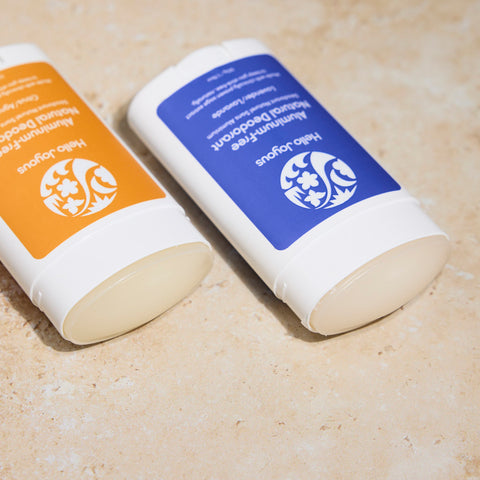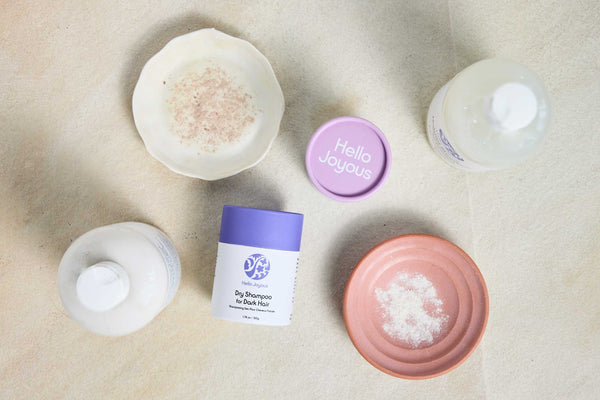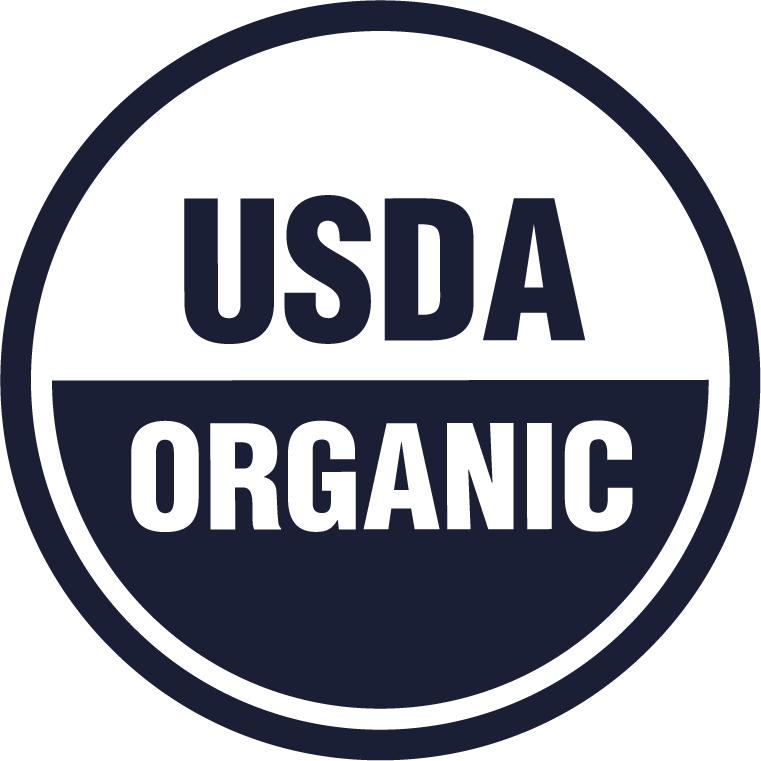At Hello Joyous we are passionate about creating functional beauty products that are great for you and kind to the planet. That’s why we are proud to share that all of our skincare, hair care, and body care products are free of chemicals of concern.
Studies have shown the conventional personal care industry including cosmetics, skincare, body care and hair care contain a multitude of chemicals of concern (COC) including parabens, siloxanes and formaldehyde releasers. In fact, 74% of these products have undisclosed ingredients listed as “fragrance”. These COCs mimic hormones, impact fertility, increase the risk of cancer and impact the immune system. Not only that, these chemicals are unsustainable and harmful to the environment.
Every day we have the opportunity to use products that nourish and support our bodies, inside and out. That’s why we want to share 10 of the most common ingredients used in conventional beauty products that you’ll want to avoid to reduce your toxic load and support the health of mama earth. The first step to making a change to your beauty routine is learning about what ingredients you want to avoid, why you want to avoid them, and how to spot them.
One of the reasons it’s so important to avoid these ingredients is that The American Journal of Public Health found that the skin can absorb between 64% and 100% of the chemicals in your beauty products. While the amount that is absorbed varies depending on factors such as skin barrier health, the size of the chemical molecule, and whether your skin is broken, avoiding these ingredients as much as possible is the best way to prevent absorption and possible health effects.
Unfortunately for the consumer, the beauty industry is widely unregulated, which means there isn’t a ton of data available on the cumulative effect of using multiple chemical ingredients on your body every day for decades. The Environmental Working Group found that women use on average 12 different products every single day. These products expose them to approximately 168 chemical ingredients. Men tend to use about 6 different products per day, exposing them to roughly 85 unique chemicals, not all of which have been tested for safety.This lack of information means that brandswill often formulate their products with ingredients based on cost and availability, as opposed to the health benefits or impacts. That’s why as a consumer it’s important to be educated on the ingredients added to your products so that you can make an informed decision on what you use on your body.
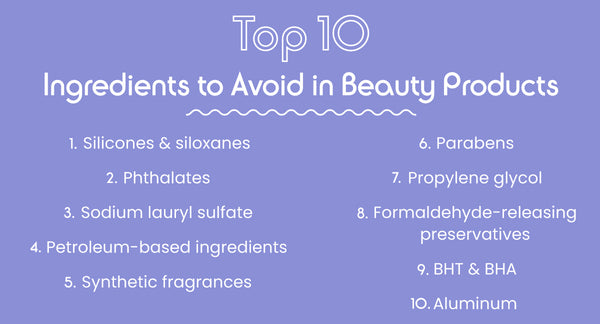
1. Silicones & Siloxanes
Silicones and their relatives, such as siloxanes, are synthetic polymers made from silica. Silicones seal the hair or skin and prevent moisture from getting in or out. They’re relatively cheap and easy to manufacture and provide a silky smooth feeling when used. Siloxanes are another silicone-based compound that are used for the same effects across the cosmetics and beauty industries.
Why should you choose products that are silicones or siloxane free?
- They’re hard to wash off
- They can block pores and cause breakouts
- They can damage and weigh down your hair
- They can negatively impact hormone function and fertility
- They don’t break down over time–they stay in the environment long term
Essentially, products with silicones in them create a film over your skin and hair that can lead to damage down the line, despite the superficial softness you might feel initially. Read more about silicones here.
2. Phthalates
Phthalates are often referred to as the “everywhere chemical” because they are found in many common beauty and skincare products and throughout the environment. These colourless, odourless chemicals never degrade, which means they can be found in everything from rainwater to soil, even contaminating the food chain!
Some of the negative health effects of phthalates include:
- Neurotoxic effects, especially in the developing brains of children
- Reproductive development issues and hormone disruption, especially in young boys
- Increased cancer risk of the uterus, breast, and thyroid
These chemicals can be found in personal care products such as:
- Shampoos and conditioners
- Perfumes
- Deodorants
- Skincare products
- Makeup
- Lotions
Diethyl phthalate (DEP) is the phthalate that is commonly used in cosmetics, synthetic fragrances, and beauty + personal care products.
For more information on this chemical listen to this great interview with reproductive epidemiologist Dr. Shanna Swan.
3. Sodium Lauryl Sulfate
You have likely seen sodium lauryl sulfate (SLS) on labels, especially in shampoos and body washes. That’s because it is commonly used as a surfactant that helps with foaming and cleansing. You can find it in other products including:
- Facial cleansers
- Exfoliants
- Liquid hand soap
- Makeup remover
- Shampoo
- Conditioner
- Body washes
- Bubble bath
- Hand creams
- Face masks
- Sunscreen
Repeated use of SLS can continually strip the natural oils from your skin and scalp. Due to the effects on the skin barrier and skin microbiome it can cause skin irritation, dryness, and allergic reactions such as dermatitis.
Using products with SLS is not recommended for anyone with inflammatory skin conditions such as eczema, rosacea, and psoriasis. If you struggle with a dry, itchy scalp then you’ll want to switch over to an all-natural shampoo and conditioner that are free from SLS. Check out the foaming action of our all-natural shampoo and conditioner right here!
4. Petroleum-Based Ingredients
Did you know that petroleum-based ingredients are refined from crude oil to make petrolatum, i.e. Vaseline? Petrolatum and other PBIs are used in many different beauty products ranging from shampoos and conditioners to anti-aging creams, moisturizers, lip balms, and makeup. High end brands often contain these ingredients despite their hefty price tags.
The problem with petroleum-based ingredients is that they create an occlusive barrier on the skin, preventing it from breathing and trapping impurities. Some people find that using products with PBIs can lead to breakouts and acne.
The negative health effects are associated with being contaminated with polycyclic aromatic hydrocarbons (PAHs). Some research has found a correlation between exposure to PAHS, including skin contact, and various types of cancers, such as lung, skin, and bladder. Other common health effects can include:
- Clogging pores, leading to breakouts
- Irritation or redness
- Contamination with dioxanes (cancer-causing substances)
- Suffocation of the skin & a negative impact on the skin microbiome
5. Synthetic Fragrances
It might blow your mind to learn that synthetic fragrances are found in up to 95% of natural care products, including deodorants, cosmetics, shampoos, conditioners, and skincare products. Their use in products is generally one of two things: they add a specific scent to a product or they can cover up a bad smell. Some manufacturers even use a combination of scents in order to claim that their products are “unscented.” In fact, signature scents can contain hundreds of different chemicals, which is more than is found in a cigarette!
Synthetic fragrances tend to be made from petroleum-based ingredients such as acetone, phenol, toluene, phthalates, limonene, and benzyl acetate. You’ll find that lots of companies rely on synthetic fragrances because they are cheaper and easier to produce than essential oils. Plus, thanks to the chemical cocktails the scent lasts a long time.
Some of the health effects of synthetic fragrances include:
- Can bioaccumulate over time, leading to long term health issues
- Associated with neurotoxicity and cancer development
- Hormone disruptions in women and men
- Associated with lowered sperm counts in men
- Associated with obesity & insulin resistance in men
- Linked to early puberty development in young girls
- Can trigger allergies and/or migraine attacks
- Can trigger asthma attacks in susceptible people–one survey found they triggered attacks in 3 out of 4 asthma sufferers!
6. Parabens
When it comes to ingredients that are super common and can really take a toll on your health, parabens make the top of this.They’re derived from petroleum-based ingredients, but their effects are so profound they deserve their own spot on the list. Parabens are widely used as preservatives to extend the shelf life of a personal care product You will find them in:
- Skincare products
- Soaps
- Shampoos and conditioners
- Cosmetics
Parabens mimic estrogen in the body, which can lead to hormonal imbalance in both men and women, even children. Endocrine disruption can cause adverse reproductive, developmental, neurological, and immunological effects. In addition to negatively impacting the endocrine system, parabens can also cause allergic reactions in the skin leading to itching, irritation, hives, flakiness, and dryness.
Parabens absorb easily through the skin and accumulate over time if you consistently use products that contain them. To lower your exposure avoid products that contain:
- Propylparaben
- Isobutylparaben
- Methylparaben
- Polyparaben
- Butylparaben
Many companies will advertise their products as paraben-free, but this is often used as a greenwashing term. Greenwashing occurs when a product is marketed as “paraben-free” only to be loaded up with another harmful ingredient, formaldehyde-releasing preservatives. That’s why it’s so important to always read your labels to know exactly what you’re putting on your body.
Propylene Glycol
Another ingredient derived from petroleum-based ingredients that deserves its own spot on this list is propylene glycol (PG). Manufacturers add it to cosmetic and beauty products to control the viscosity. It’s also used as a humectant to help the skin attract water and encourage other ingredients to penetrate the skin.
Propylene glycol is common in products designed to moisturize hair and skin, including body lotions, shampoos, conditioners, face masks, serums, cosmetics and moisturizers.
The EWG has found that propylene glycol exposure in concentrations as low as 2% is associated with:
- Irritant and allergic contact, including urticaria (hives, welts, and rashes)
- Contact dermatitis
Propylene glycol should be avoided if you have inflammatory skin conditions such as psoriasis, rosacea, eczema, allergies, or sensitive skin. We suggest using a non-toxic alternative, propanediol, which is derived from corn-sugar and Eco-cert approved. It’s what we use in our all-natural deodorants to keep your pits stink-free. You can also replace propylene glycol with plant-based humectants such as organic vegetable glycerin, which is what we use in our Fresh Face Cleanser and Lavender Shampoo.
8. Formaldehyde-Releasing Preservatives
Formaldehyde-releasing preservatives are used as preservatives in many beauty and personal care products from hair care to nail polishes. However, they’re anything but good for your glow! Thankfully, most cosmetic and beauty products do not contain pure formaldehyde since it's a well-known contact allergen. That said, many preservatives used in the beauty industry slowly release formaldehyde when in the presence of water. You’ll find them in shampoos and anti-wrinkle creams especially. In fact, about 20% of beauty and cosmetic products contain formaldehyde-releasing preservatives!
These preservatives are one of the most common allergens for children with contact dermatitis, which is bad news since they are often found in baby soaps and wipes. Formaldehyde-releasing preservatives can cause:
- Blisters and skin burns in severe cases
- Contact dermatitis
- Skin irritation or redness
- Irritation to the eyes, nose, and throat
They are considered carcinogenic when inhaled!
One thing to note is that formaldehyde allergy can develop from repeated low-level exposure, such as what you would get by using products that contain these chemicals daily.
9. BHT and BHA
Products that contain fats and oils are more prone to rancidity, which is why you will often find BHT and BHA added to the formula. They are synthetic antioxidants that prevent these oils and fats from going rancid. You’ll likely find them in the following products:
- Moisturizers and creams
- Lip sticks and other lip products
- Hair products
- Fragrances
- Deodorants and antiperspirants
- Makeup products such as eye shadows
These chemicals may cause hormone disruption and allergic reactions so they’re best avoided for overall health. The International Agency for Research on Cancer classifies BHA as a possible human carcinogen because some studies have found that they may be carcinogenic and can negatively impact the health of the liver, thyroid, kidneys, and lungs. Health Canada has labeled BHA a “high human health priority”.
10. Aluminum
You will commonly find aluminum in antiperspirants since it blocks pores to stop sweating. However, this is not a good thing! We need to sweat in order to help cool the body and aid in detoxification. In addition to being used in antiperspirants you can find alum (the commonly used form) in cosmetics and beauty products since it has astringent and antibacterial properties. You can find them in the following:
- Baby products–bubble baths, baby oils & creams
- Cleansers
- Sunscreen
- Nail polishes
- Antiperspirants
- Lotions
- Body washes
- Shampoos & conditioners
- Cosmetics
- Perfumes
- Toothpastes
- Mouthwashes
This additive can cause the following effects:
- Blocking the sweat glands
- Skin irritation
- May be linked to Alzheimer’s Disease
- Can be poisonous if ingested
- May be linked to breast cancer.
Non-Toxic Beauty Products
At Hello Joyous we’ve created products you can trust because we've eliminated all the unnecessary fillers, junk and harmful additives, have completely transparent labelling and we are determined to bring products that help you find more joy in the everyday. We hope this guide to ingredients to avoid has empowered you with knowledge to create a clean beauty routine that works for your skin.
Our products are made from concentrated botanical extracts rich in antioxidants from nature. There are no fillers like water, therefore no need for synthetic preservatives. Instead of water, we use functional carriers for our organic botanicals like organic aloe and organic vegetable glycerin derived from coconut that keep the phytonutrients intact and stable.
You can feel confident exploring Hello Joyous for all-natural, plant-powered skincare, hair care, and body care products! We are committed to making products without any hormone disrupting chemicals, parabens, phthalates, synthetic fragrance, mineral oil, fillers, SLS, harsh detergents, GMOs or any other junk you don’t want in or on your body./p>
Read more
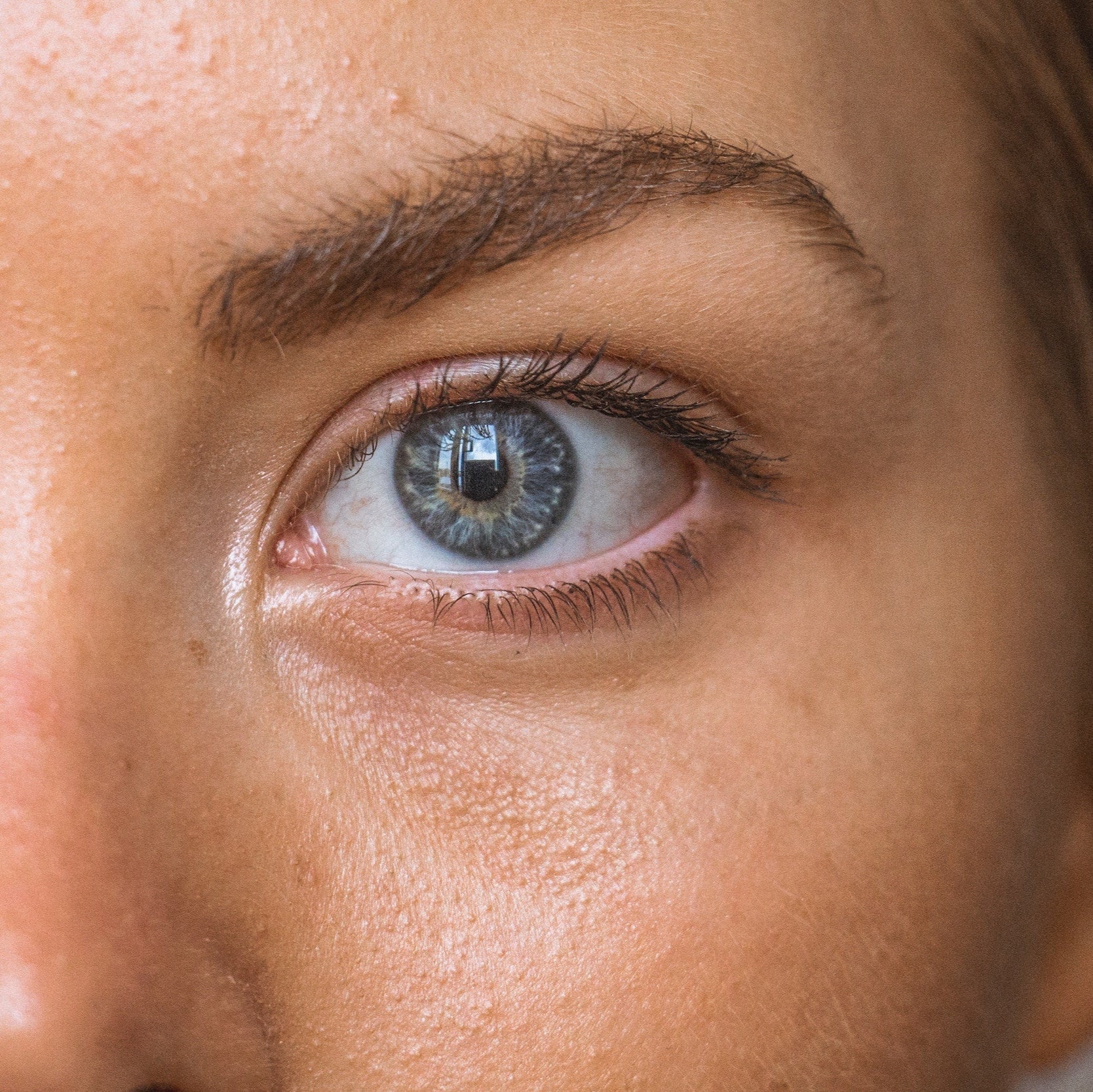
7 common causes of dark under-eye circles and the solutions that you can incorporate into your routine to help reduce their appearance, naturally.
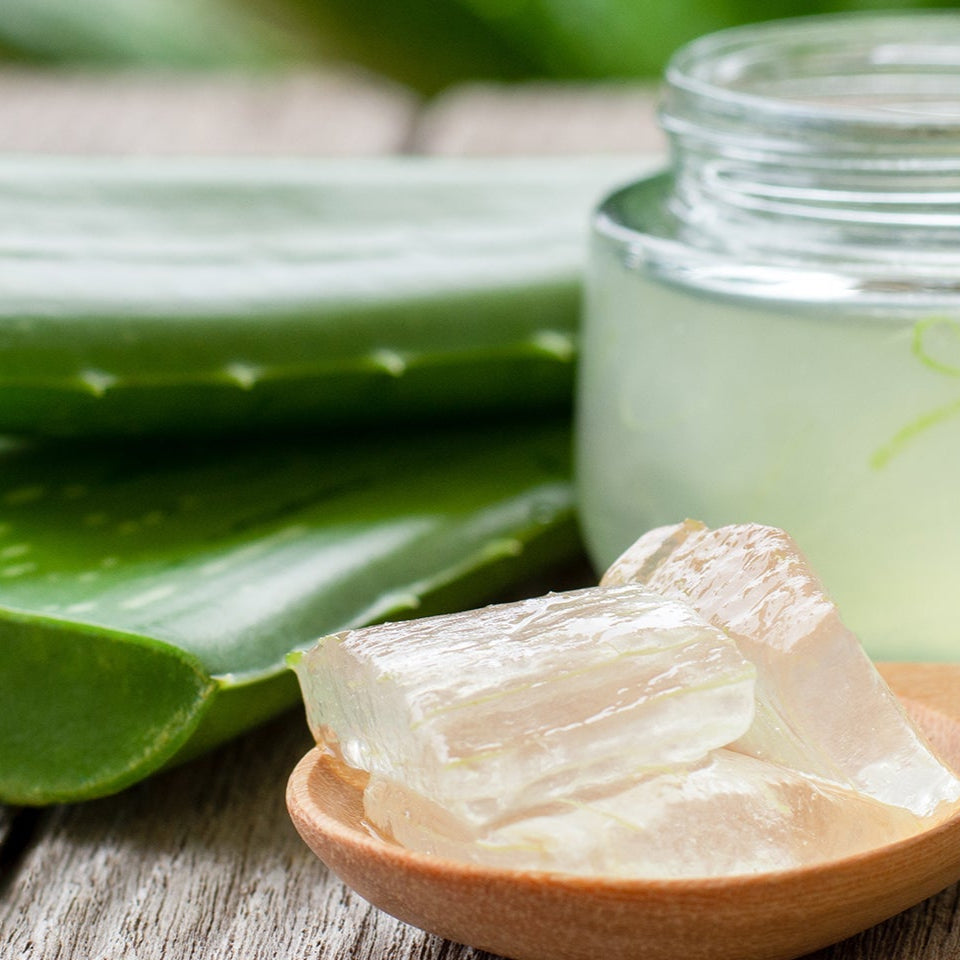
When we set out to create Hello Joyous beauty products we wanted to tap into the abundance of incredible healing plants to create the foundation for our products. Today we’re going to take a closer...
